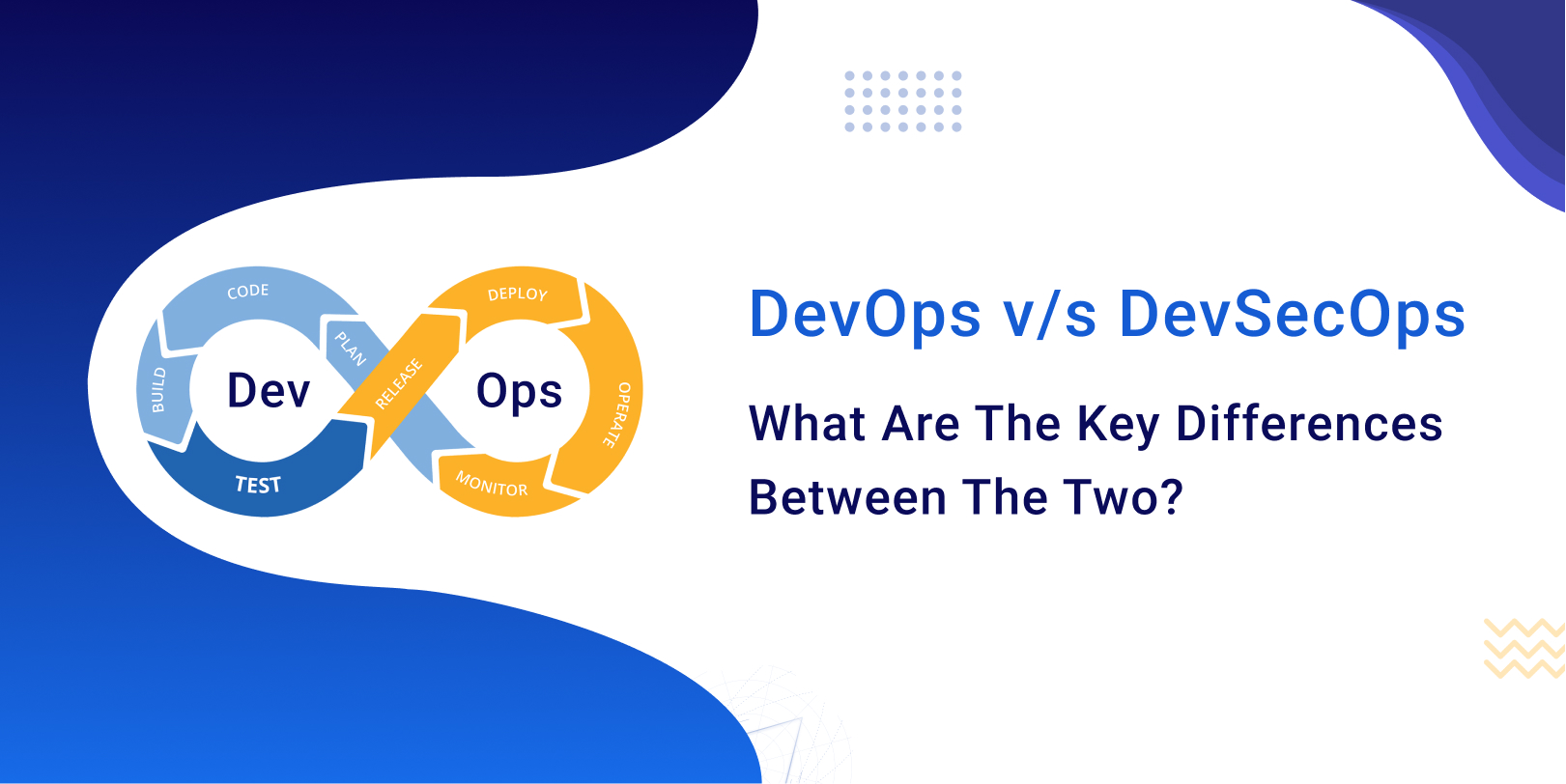As the demand for change signals the ongoing deployment of disruptive technologies, the software development company landscape is constantly on the cutting edge of innovation. At each turn of the wave, a distinct development approach emerges.
Today, many, if not most, software development professionals use the agile technique. The focus has shifted from process improvement to ability prioritization, resulting in advanced development approaches such as DevOps and DevSecOps.
The primary contrasts between DevOps vs DevSecOps have been explored in this post; however, before going into the differences, let’s first gain a holistic grasp of each idea.
What is DevOps
The DevOps technique combines two components. ‘Dev’ refers to software development, whereas ‘Ops’ refers to information technology services.
DevOps is a collection of approaches designed to shorten the time it takes to deliver software updates and features to users. DevOps is intended to automate and optimize the software delivery process, from development to testing and deployment to production. One of the primary aims of DevOps is to reduce the number of processes necessary for developers to get their work into production.
DevOps strives to increase communication and collaboration between mobile app development, web development and operations teams as well. DevOps may help firms enhance productivity and speed up delivery times by automating jobs and standardizing procedures.
What is DevSecOps?
DevSecOps combines DevOps with SecOps to provide a cycle system for software development, technology operations, and cybersecurity.
The goal of DevSecOps is to aid in the rapid development of a reliable codebase. Rather than emphasizing development or security, the DevSecOps technique encourages developers and security professionals to adopt a balanced viewpoint. Development and security teams may provide continual assistance by utilizing a flexible framework.
Similarities Between DevOps and DevSecOps
DevOps and DevSecOps have many similarities. Both practices have a similar ethos and employ automation as well as active monitoring. Though they have distinct objectives, the two techniques are meant to satisfy comparable needs and both strive to better your business by bringing together teams from various departments.
Cultural Similarities
The emphasis on community is the cultural link between DevOps and DevSecOps. To execute activities or generate goods, many departments are brought together. This collaborative culture brings together different teams inside your organization to break down barriers and improve the development process.
This culture enhances efficiency and minimizes bottlenecks in DevOps. DevSecOps is a culture that attempts to include cloud security at every stage and reduce vulnerability while increasing compliance. Because the cultures are so similar, the two techniques rely on identical instruments.
The Role of Automation
Automation in the context of application development refers to the use of technology to accomplish activities with less human intervention. Automation in DevOps and DevSecOps aids in the workflows of continuous integration, continuous delivery, and continuous deployment.
The Automation speeds up feedback loops between the development and operations teams, allowing updates to be released more rapidly. Automation in DevSecOps automates secure operations, decreasing overhead and human error. Automation is available in both scenarios to improve the process and increase efficiency.
The Role of Active Monitoring
Active monitoring in DevSecOps includes both internal security tools (to guarantee safe code does not create security vulnerabilities) and cloud-based technologies. Monitoring cloud security entails keeping an eye out for fraudulent logins, application problems, and unauthorized access. Active monitoring allows for the patching of software before security is compromised.
The key to monitoring in both disciplines is to take a proactive rather than a reactive approach. Code can be built or altered more effectively and securely if it is kept up to date with changes in the environment. While DevOps and DevSecOps have many similarities, there are many key distinctions in how they operate.
In DevSecOps, active monitoring comprises both internal security tools (to ensure that safe code does not introduce security flaws) and cloud-based solutions. Monitoring cloud security means looking for fraudulent logins, application issues, and unauthorized access. Active monitoring enables software patches to be applied before security is compromised.
The key to effective monitoring in both disciplines is to be proactive rather than reactive. If code is maintained up to date with changes in the environment, it may be built or adjusted more effectively and safely. While DevOps and DevSecOps share many similarities, they function in quite different ways.
DevOps vs DevSecOps: Detailed Comparison
Philosophy
There are two primary schools of thinking in software development: DevOps and DevSecOps. Both theories have advantages and disadvantages and choosing one to use depends on the needs of your company. DevOps is all about efficiency and speed. The emphasis is on releasing new features as soon as feasible without sacrificing quality. This method is suitable for firms that need to provide new software upgrades quickly.
DevSecOps, on the other hand, focuses more on security. The objective is to keep risks and vulnerabilities from ever entering the codebase. This method is better suitable for firms that deal with sensitive data or are subject to severe compliance laws. When it comes to DevOps vs DevSecOps, there is no right or wrong solution. The optimal method is the one that best matches your organization’s needs. To have a better understanding of this essential practice, you may increase your knowledge level with the Best DevOps Training.
Purpose
Both DevOps and DevSecOps are software development approaches that emphasize cooperation and communication between developers and operations teams. However, there is a significant difference between DevOps and DevSecOps: DevOps focuses on streamlining the software development process, whereas DevSecOps prioritizes security. DevSecOps can assist to decrease the risk of vulnerabilities and simplify compliance with security laws by including security in the development process from the beginning.
As a result of the DevOps vs. DevSecOps debate, DevSecOps is frequently seen as a more thorough approach to software development than DevOps. As a result, both methodologies may be utilized to boost software development efficiency and quality.
Goal
DevOps is a relatively recent methodology that stresses cooperation between development and operations teams. The purpose of DevOps is to increase the speed and efficiency of software development by simplifying the process from start to end. One of the primary benefits of DevOps is that it helps to minimize silos between various teams, which may frequently lead to delays and bottlenecks. As a result, one of the drawbacks of DevOps is that it can be difficult to deploy, particularly in big firms with established processes and procedures.
DevSecOps is a DevOps variant that emphasizes security. DevSecOps, like DevOps, seeks to increase the speed and efficiency of software development. DevSecOps, on the other hand, requires security to be considered at every level of the development process. This can aid in preventing vulnerabilities from being introduced into code, but it can also slow down the development process overall. As a result, DevSecOps may not be appropriate for software development company that want to move swiftly and often deploy new features.
Team Skill Set
DevOps teams are in charge of creating and maintaining the software that powers an organization’s IT infrastructure. DevSecOps teams, on the other hand, are in charge of guaranteeing the security of the same program. To be effective, both sorts of teams must be highly talented. There are, however, some significant distinctions between the two.
The DevOps teams are more concerned with the technical elements of software development, whereas DevSecOps teams are more concerned with security. As a consequence, DevSecOps teams frequently have a better grasp of how to secure software. They are also more proactive in their approach to security, rather than merely responding to issues when they occur.
Security Begins
In general, software development addresses security from two angles. DevOps and DevSecOps differ in their methods of delivering software quicker and more efficiently, but also take distinct approaches to security. DevOps focuses on automating the software delivery process, whereas DevSecOps prioritizes security. As a result, DevSecOps is frequently seen as the more secure alternative.
However, when it comes to security, both systems offer advantages and downsides. DevOps may be faster and more effective, but DevSecOps is more likely to detect possible security flaws before they become a problem. Finally, the ideal strategy in DevOps vs DevSecOps will rely on your individual needs and goals.
Conclusion—The Distinction Between DevOps and DevSecOps
DevOps and DevSecOps techniques share characteristics, such as the use of automation and consistent procedures for developing collaborative development cycles. However, whereas DevOps emphasizes delivery speed, DevSecOps shifts security to the left.
Initially, DevSecOps approaches may reduce development time, but they will ensure that the codebase is secure from the start. Custom software development company will benefit from increased work and delivery speed for stable codebases after some training and once the agreement is completely included in the development approach.


























